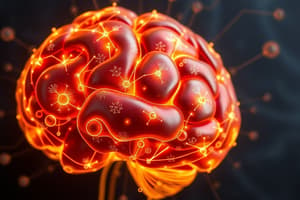Podcast
Questions and Answers
Which mental activity is NOT typically involved in thinking?
Which mental activity is NOT typically involved in thinking?
- Imagining
- Creating
- Singing (correct)
- Judging
In deductive reasoning, how do we process information?
In deductive reasoning, how do we process information?
- From general assertions to specific conclusions (correct)
- From specific instances to general rules
- From abstract ideas to literal interpretations
- From observed behavior to abstract concepts
What is a primary characteristic of inductive reasoning?
What is a primary characteristic of inductive reasoning?
- It starts from available evidence to form general principles (correct)
- It is used exclusively in mathematical contexts
- It relies on absolute truth from premises
- It derives specific conclusions based on general rules
When categorizing a potato, which type of thinking is being used?
When categorizing a potato, which type of thinking is being used?
Which statement best represents an example of deductive reasoning?
Which statement best represents an example of deductive reasoning?
What is the main goal of problem-solving according to the discussed thinking process?
What is the main goal of problem-solving according to the discussed thinking process?
How are concepts critical to the thinking process?
How are concepts critical to the thinking process?
Which of the following statements accurately describes abstracting?
Which of the following statements accurately describes abstracting?
What role does reasoning play in thinking and problem-solving?
What role does reasoning play in thinking and problem-solving?
What is a mental set in problem-solving?
What is a mental set in problem-solving?
Which of the following best describes an algorithm?
Which of the following best describes an algorithm?
When is it most appropriate to use a heuristic for problem-solving?
When is it most appropriate to use a heuristic for problem-solving?
What is the primary characteristic of the trial and error strategy?
What is the primary characteristic of the trial and error strategy?
Which of the following statements about heuristics is true?
Which of the following statements about heuristics is true?
What is an example of a heuristic mentioned in the content?
What is an example of a heuristic mentioned in the content?
What effect does a mental set have on problem-solving?
What effect does a mental set have on problem-solving?
Why might trial and error be considered time-inefficient?
Why might trial and error be considered time-inefficient?
Which condition does NOT typically prompt the use of a heuristic?
Which condition does NOT typically prompt the use of a heuristic?
What typically happens when someone uses a familiar strategy that previously worked for a similar problem?
What typically happens when someone uses a familiar strategy that previously worked for a similar problem?
What term describes the process of acquiring knowledge?
What term describes the process of acquiring knowledge?
Which cognitive function is NOT directly associated with thinking?
Which cognitive function is NOT directly associated with thinking?
Where are the cognitive processes regulated in the human brain?
Where are the cognitive processes regulated in the human brain?
Which of the following is a core aspect of thinking?
Which of the following is a core aspect of thinking?
Which process involves the manipulation of information based on stored knowledge?
Which process involves the manipulation of information based on stored knowledge?
What is the relationship of imagination to cognitive functions?
What is the relationship of imagination to cognitive functions?
Thinking can occur even when a person is in which state?
Thinking can occur even when a person is in which state?
What is NOT a cognitive activity mentioned in the context of thinking?
What is NOT a cognitive activity mentioned in the context of thinking?
Flashcards are hidden until you start studying
Study Notes
Understanding Thinking
- Thinking is a cognitive function that involves manipulating ideas, images, and mental representations.
- It utilizes stored knowledge for tasks like remembering, imagining, problem-solving, and concept formation.
- Humans rationalize problems by logically establishing relationships among concepts and forming opinions based on environmental evaluations.
Cognition and Knowledge Acquisition
- The process of acquiring knowledge is termed cognition, influenced by cognitive functions such as attention and imagination.
- Cognitive processes are managed by the cerebral cortex, highlighting their specificity to human beings.
- Cognition utilizes concepts, facts, propositions, rules, and memories.
Nature of Thinking
- Thinking can occur even during sleep, with awareness differentiating it from non-thinking activities.
- It is a constructive process, transforming information into new representations and involving activities like inferring, abstracting, and creative thinking.
Problem-Solving Process
- Problem-solving initiates thinking, which follows steps like judging, abstracting, inferring, and reasoning.
- Decisions may depend on various factors like conditions of the environment, traffic situations, and safety considerations.
Concepts and Reasoning
- Concepts categorize objects and events, allowing systematic organization of knowledge. They can infer behaviors but cannot be directly observed.
- Reasoning, essential for logical thinking and problem-solving, involves drawing conclusions from facts and stored information. Two types of reasoning:
- Deductive Reasoning: From general premises to specific conclusions (e.g., "All fruits have seeds, therefore mangoes have seeds").
- Inductive Reasoning: From specifics to general conclusions, which may not always be empirically true (e.g., "Some good students love reading, thus good students may love reading").
Role of Problem-Solving
- Problem-solving is integral to daily life, varying in complexity and duration. It uses both internal (mental) and external (social) resources to find solutions.
- A mental set refers to the tendency to approach new problems with strategies that worked in the past, which may hinder innovative thinking.
Problem-Solving Strategies
- Trial and Error: Involves testing multiple solutions until one works; often time-consuming.
- Algorithms: Step-by-step instructions that guarantee the same outcome, often found in computing and like a recipe.
- Heuristics: General problem-solving frameworks or mental shortcuts that expedite decision-making, though not always rational or accurate.
Conditions for Employing Heuristics
- Heuristics are utilized under specific conditions:
- When faced with excessive information.
- When a decision must be made quickly.
- For decisions deemed unimportant.
- With limited information available.
- When a familiar heuristic comes to mind.
Application of Heuristics
- A common heuristic is breaking down large tasks into smaller steps, making daunting projects manageable (e.g., writing a long essay).
- A "working backwards" approach focuses on the end result, assisting in effectively solving a problem.
Studying That Suits You
Use AI to generate personalized quizzes and flashcards to suit your learning preferences.




